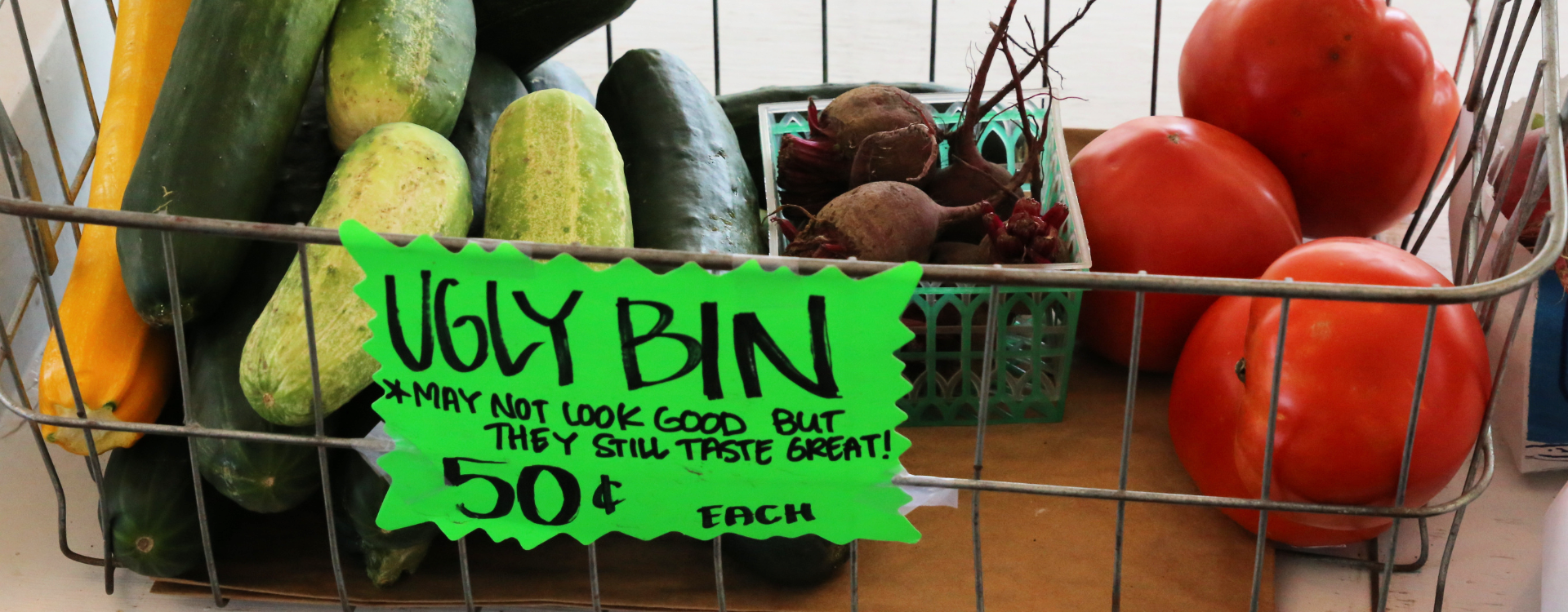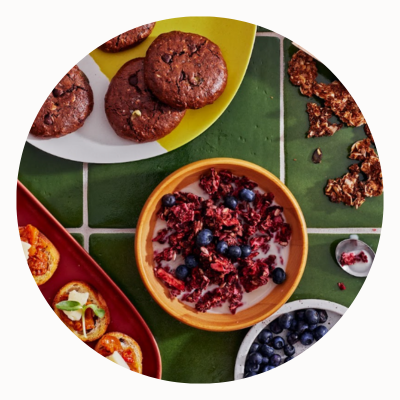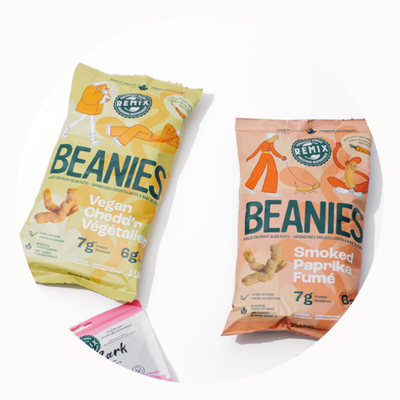Meet the women revolutionizing healthy snacks, one imperfect fruit at a time
April 16, 2025 | By Sophie Hares
After studying food waste and nutrition at Ontario’s University of Guelph, Monique Chan returned home to Toronto and found work at farmers markets. But she was dismayed to learn that vendors would often throw away the unsold boxes of perfectly ripe produce at the end of the day — and that some produce, deemed imperfect because of variations in size or color, never even made it to market.
Chan, who had worked in restaurant kitchens while in school, began spending her evenings experimenting with produce salvaged from the market to find ways to upcycle the fruits and greens farmers worked so hard to grow. Soon buyers were lining up at the market to buy Chan’s cold-pressed juices and energy balls that she whizzed up in the commercial kitchen she rented. In 2019, she turned her passion for upcycling into her Bruized snack business.

When she needed assistance marketing her growing range of products, Chan’s lifelong best friend, Justice Walz, threw herself into the business as a creative collaborator and co-owner, and her brand design and creative direction helped shape Chan’s ideas into a tangible reality.
Today, they use organic juice pulp sourced from local juicery Freshouse Food & Juice Bar to make their Pulp Crunch high-fiber clusters, and they source imperfect fruit and vegetables from farmers and distributors for the Salted Choco-Pearamel and Bananarama cookies they sell online and in area stores.
“There’s no shortage of food being produced,” Chan says. “We need to bridge the gap between surplus and imperfect food for people who want to eat more locally, find nutrient dense foods and support Canadian businesses.”
Bruized is one of a growing number of companies that are helping crack down on rampant waste by converting food such as blemished produce that would otherwise be trashed into new products. Or not even blemished — Chan says the bananas they source are bright yellow free of spots, but they’re considered too ripe at the distribution level because grocery stores want them green.
According to the United Nations Environment Program, a third of all food globally — some 1 billion meals a day — is going to waste before it reaches a plate, while some 780 million go hungry. Households, food services and retailers are among the biggest culprits when it comes to wasted food, which is valued at $1 trillion per year, uses vast quantities of water for growing and is responsible for up to 10% of global methane emissions.
In Canada, where an estimated half of all food goes to waste, farmers often discard produce simply because it fails to match the unblemished, perfectly shaped fruit supermarkets demand from their suppliers. Markham, Ontario-based Remix Snacks is another company on a mission to raise food waste awareness as it integrates ground black beans and imperfect fruit into its dark chocolate Bean Bark snacks.



Not unlike Bruized, Remix Snacks began when McGill University dietetics students Isabelle Lam and Jamie Lee started dehydrating fruit and tempering chocolate in their apartment as they brainstormed ways to cook protein-rich snacks that cut food waste. After they won a student pitch competition, the pair were soon featured in an episode of “Dragons' Den” (Canada’s version of “Shark Tank”) in 2019, where they gained traction for their Bean Bark products. Now their vegan snacks are sold in some 400 stores including Whole Foods.

But growing the company and expanding its range soon threw up the challenge of finding the stable supplies of food waste needed to fulfil orders, Lam says. Instead of investing time tracking down the fruit it needs each day, Remix now relies on suppliers to source previously unsellable fruit from farms and distributors.
While Canadian consumers may be increasingly aware of the economic and environmental impact of food waste, their decision to buy snacks made from upcycled ugly fruit still largely hinges on how good they taste.
“The first thing they’re always concerned about is taste and nutritional value,” Lam says. “The upcycle and sustainability piece is kind of a bonus versus a compelling reason to buy.”
Earlier this year, both Bruized and Remix Snacks were among 10 women-owned small businesses to receive a CAD$10,000 grant (about USD$7,200) and mentoring opportunities from Mastercard as recipients of the Mastercard x Pier Five Small Business Fund to help take their businesses to the next level.
For Bruized, the grant opens the door to hire more staff as Chan and Walz look to shift to wholesale and one day open chapters across Canada to replicate its circular model of turning food waste into a valuable resource.
“People are shockingly unaware of how prevalent food waste is,” Walz says. “Considering the climate crisis and the rising cost of goods, it's really important that we're not wasting all the limited resources like fresh water, land, energy, and money that goes into producing food. We hope to show that with a little creativity and care, we can restructure our current food systems to prevent good food from falling through the cracks."